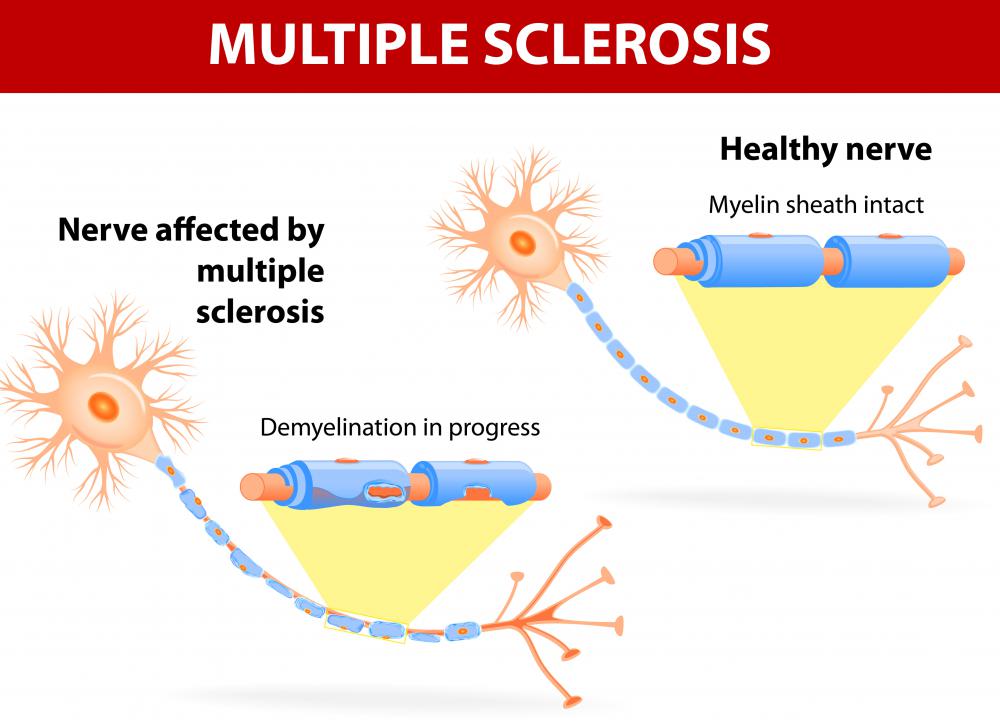At TheHealthBoard, we're committed to delivering accurate, trustworthy information. Our expert-authored content is rigorously fact-checked and sourced from credible authorities. Discover how we uphold the highest standards in providing you with reliable knowledge.
What are the Different Types of Nerve Disorders?
Nerve disorders affect one or more of the body’s nervous systems and can potentially impact speech, motor skills, cognitive ability, heart function, and even breathing. In addition to the central nervous system, specific disorders can also involve the autonomic nervous system or the peripheral nervous system. While some conditions are genetically inherited and considered degenerative, others can occur over time due to impaired metabolic functioning, as is often the case with diabetes type I. Some problems are also attributed to bodily injury or trauma, long-term substance abuse, or chronic exposure to environmental toxins.
Degenerative, or progressive, nerve disorders are generally the most serious and difficult to treat. They also tend to run in families. These types of disorders include Alzheimer's disease, Parkinson's disease, Huntington's disease, and multiple sclerosis. While there are medications and occupational therapies available to help manage or minimize symptoms of some of these conditions, there is no cure for any of them. In addition, some occur more often in older patients, although they are not actually considered a normal part of aging.

Disorders of the cranial or facial nerves include vestibular schwannoma (also known as acoustic neuroma), Ménière's disease, and Bell’s palsy. Since vestibular schwannoma stems from benign tumor formations along the sheath cells of the cranial vestibulocochlear nerve, it is sometimes possible to relieve symptoms of the condition with surgical intervention or radiation. Ménière's disease, on the other hand, which is characterized by dizziness and hearing loss, is often due to damage to the inner ear by injury or viral infection. Bell’s palsy involves a temporary dysfunction of the fifth cranial nerve, resulting in paralysis or weakness in the muscles of one side of the face, a condition that usually improves on its own within a few weeks or months.

Peripheral nerve disorders are categorized into three broad types: peripheral neuropathy, autonomic neuropathy, and mononeuropathy. Peripheral neuropathy is the most common type and typically produces a burning or tingling sensation in the legs and feet; however, nerve damage can progress and extend to the organs as well. Autonomic neuropathy involves various nerves that regulate many of the body’s internal functions, such as heart rate, blood pressure, breathing, digestion, and bladder control. In contrast, mononeuropathy is isolated to a single nerve or network of nerves, which is referred to as a trunk. This type of disorder can develop due to inflammation or chronic compression, such as that which occurs with carpal tunnel syndrome and sciatica.
AS FEATURED ON:
AS FEATURED ON:












Discussion Comments
These doctors need to get with it! They ruin people's lives.
We, Brie and Danielle, are two teenagers. We both suffer from Reflex Sympathetic Dystrophy (RSD) or Complex Regional Pain Syndrome (CRPS), which is pretty much when our sympathetic nerves get over-excited and send exaggerated messages to our brain.
The RSD is in my arm and Brie's leg, making those limbs extremely sensitive to touch as well as extremely painful 24/7. So when you touch my arm or Brie's leg, our brains will tell us that it’s pretty much like being stabbed, rather then it just being touched. Well at least, that's the simple explanation.
This disease is not what could be called a black and white disease. There is no magic pill or surgery that can make all the pain go away. This disease isn’t very common especially in adolescents; however its occurrence is becoming more frequently seen and recognized. We are hoping to get awareness out there. We also want to try and show that there is hope and to share our stories and experience to others suffering or who have suffered from RSD.
One of the most common manifestations of nerve disorders is nerve pain in the hands and wrists.
As with carpal tunnel syndrome, patients experience swelling and inflammation in their wrists, hands, and lower arms, and possibly tingling in their fingers.
This is often caused by damage to the median nerve, which can become compressed as it passes through the carpal tunnel of the wrist.
Ulnar nerve malfunction is another common culprit for nerve-related pain in the hands.
So take care of your hand nerves people -- you have no idea how much of an impact losing full use of your hands can have on your life until you experience it.
Another common nerve disorder is RSD nerve disorder. This is also called reflex sympathetic dystrophy.
It's a pretty scary disease, because it causes intense, searing pain in different parts of your body with no apparent cause. Although this kind of pain does occur at the site of bullet wounds or extreme trauma, sometimes it just happens with no recognizable cause.
Also, it tends to get worse rather than better, and it is chronically underdiagnosed because people think that the sufferer is just complaining or oversensitive.
However, if it is caught early, say, in under six months, then the chances of remission are good.
So if you or someone you know is experiencing extreme, localized pain -- kind of similar to pinched nerve symptoms -- try to get a doctor to take it seriously enough to run tests -- the longer you wait, the higher chance that the pain will become irreversible.
I never knew there were so many different nerve disorders. My grandmother had Alzheimer's disease, and my father had Parkinson's, but that's about as far as my experience with nerve disorders goes -- luckily I'v never experienced anything like that, those spinal nerve disorders and vagus nerve disorders sound so scary!
Of course, then you had my grandfather who called all kinds of psychiatric problems "nervous" disorders, which got you send to the "nervous hospital"...he just got that from growing up in a different age, I guess.
Post your comments